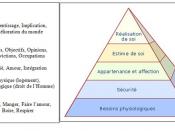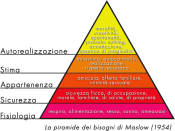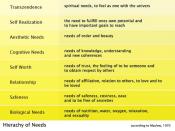During the 1950's early management theorist, Abraham Maslow's Hierarchy of Needs theory and Douglas McGregor's Theory X and Theory Y, represented a period in the development of motivation concepts. A comparative review sets a foundation for practicing managers, who chose regularly to use their terminologies in explaining employee motivation. Even though these theories are now heavily disputed and there validity called into question, they are still being practiced in motivating employees. Maslow's and McGregor's descriptive presentations of comparative motivation and management theories are available in psychology and management textbooks that can be found in libraries all around the world.
Abraham Maslow received his BA and Ph. D. all in psychology from the University of Wisconsin (Boeree, 2004/1998). Upon graduation, he returned to New York, where he became interested in research on human sexuality (Boeree, 2004/1998). Maslow served as the chair of Psychology department for ten years at Brandeis; this is where he was introduced to the idea of self actualization and begins theoretical work (Boeree, 2004/1998).
The theory Maslow is best known for is human motivation, based on the principle that man is a wanting animal (Robbins, 2001). "A more descriptive but less substantive definition would say that motivation is the willingness to do something and is conditioned by this action's ability to satisfy some need for the individual." (Robbins, 2001, p. 44) The general trend is people are motivated to fulfill the lowest level of need and when they are satisfied, a new/higher need emerges and people will search to satisfy that need as well (Boeree, 2004/1998). "A need, in our terminology, is a physiological or psychological deficiency that makes certain outcomes appear attractive." (Robbins, 2001, p. 44) This has become known as the Hierarchy of Needs (Boeree, 2004/1998). As stated in Robbins (2001),He hypothesized that within...


